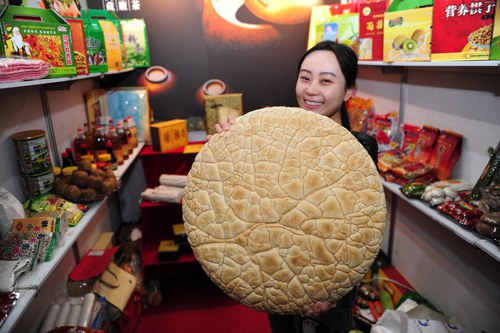|
 |
|
EAT ME: An exhibitor holding a Guokui, a type of baked wheat cake, at an agricultural product promotional exhibition held in Xi'an, capital of northwest China's Shaanxi Province, on November 12 (DING HAITAO) |
Moderate Inflation
China's consumer price index (CPI), a main gauge of inflation, grew 3.2 percent year on year in October, up from 3.1 percent in September, according to the National Bureau of Statistics (NBS).
In the first 10 months, CPI growth stood at 2.6 percent on average, well below the government's full-year target of 3.5 percent.
Yu Qiumei, a senior statistician with the NBS, said the country's inflation remains stable.
He attributed the rise in October to a rebound in prices of non-food products, including clothing, home appliances and daily necessities.
Food prices dropped 0.4 percent month on month in October, while those of non-food products rose 0.3 percent, according to the NBS.
NBS data also showed that China's producer price index, which measures inflation at the wholesale level, fell 1.5 percent in October compared to a year ago.
Exports Up
China's exports reversed their decline and rose 5.6 percent year on year in October to 1.14 trillion yuan ($185.4 billion), according to the General Administration of Customs.
The country's exports fell 0.3 percent in September from a year earlier, ending two consecutive months of rises.
Imports rose 7.6 percent in October from a year ago, accelerating from September's 7.4-percent up.
This left the country with a trade surplus of 192.38 billion yuan ($31.1 billion) in October, down 3.3 percent year on year.
In the first 10 months of 2013, exports and imports gained 7.6 percent from a year earlier, with the trade surplus growing 12 percent year on year to 1.25 trillion yuan ($200.46 billion).
Trade with the European Union, the nation's largest trade partner, climbed 0.5 percent year on year during the January-October period, compared with a 0.8-percent decrease registered in the first nine months.
Trade with the United States, China's second largest trade partner, rose 6.9 percent in the first 10 months, while that with Association of Southeast Asian Nations (ASEAN) members increased 10.9 percent. Trade with Japan, however, declined 7 percent.
New Yuan Loans
Yuan-denominated lending in October came in at a touch over 506.1 billion yuan ($82 billion), an increase of 700 million yuan ($115 million) from the same period last year, according to the People's Bank of China (PBC), the central bank.
The volume was a retreat from the 787 billion yuan ($129 billion) in September and well below market expectations.
"Most of the decline is seasonal, as loan demand usually softens toward the year's end," according to Lu Ting and Zhi Xiaojia, China economists with Bank of America Merrill Lynch, in a research note, adding that the decline could also reflect weaker loan supply.
New yuan loans for the first 10 months amounted to 7.78 trillion yuan ($1.28 trillion), up 557.7 billion yuan ($91.54 billion) from a year earlier, the PBC said.
In consideration of the new dynamics in the economy, analysts largely believe the central bank would maintain a steady stance while fine-tuning its policies to balance growth and reforms.
"Though we cautioned in mid-October that the government could scale back its pro-growth measures and the PBC prevent credit growth from quickening, we don't think the latter would significantly tighten monetary policy as the new leaders still need a stable economic and financial environment," noted both Lu and Zhi.
| 